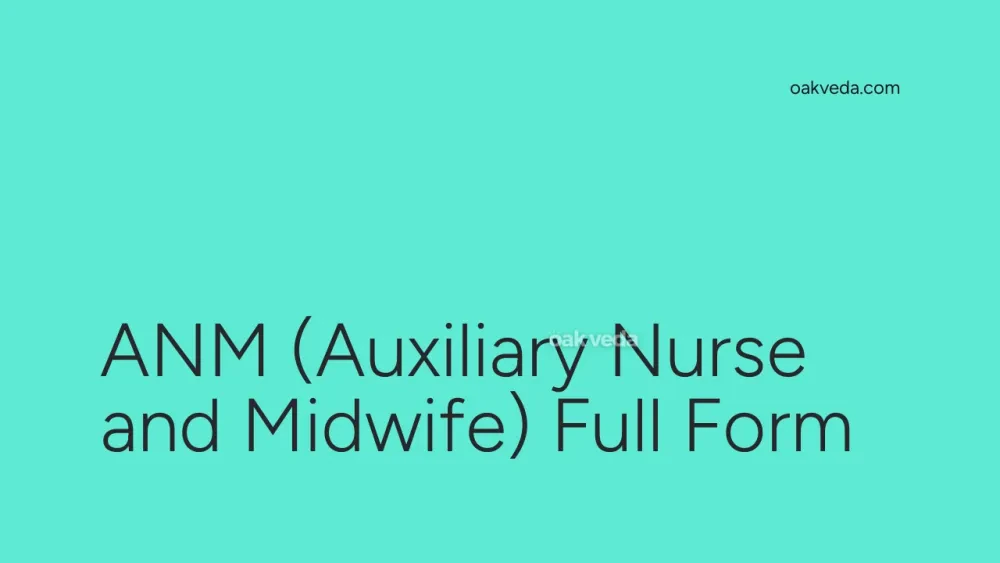
What is the Full Form of ANM?
The full form of ANM is Auxiliary Nurse and Midwife. This abbreviation represents a crucial role in the healthcare sector, particularly in rural and underserved areas. ANM professionals play a vital part in providing primary healthcare services and supporting maternal and child health initiatives.
What is Auxiliary Nurse and Midwife?
An Auxiliary Nurse and Midwife is a healthcare professional trained to provide basic nursing care and assist in childbirth. The ANM course is a diploma program that equips students with the knowledge and skills necessary to deliver essential healthcare services, particularly in community settings.
Origin and Development of Auxiliary Nurse and Midwife
The concept of Auxiliary Nurse and Midwife emerged as a response to the growing need for healthcare professionals in rural and remote areas. In India, the ANM program was introduced to bridge the gap in healthcare delivery and improve maternal and child health outcomes. Over the years, the role has evolved to encompass a broader range of healthcare services.
How does the ANM Program Work?
The ANM program is typically a two-year diploma course that combines theoretical knowledge with practical training. Students learn various aspects of healthcare, including:
- Basic nursing procedures
- Maternal and child health care
- Community health
- First aid and emergency care
- Health education and counseling
- Basic pharmacology
The course structure is designed to prepare students for real-world healthcare challenges, especially in resource-limited settings.
Functions of Auxiliary Nurse and Midwife
ANM professionals perform a wide range of functions, including:
- Providing basic nursing care
- Assisting in childbirth and postnatal care
- Administering vaccinations and immunizations
- Conducting health education programs
- Maintaining health records and reports
- Identifying and referring complicated cases to higher healthcare facilities
- Participating in disease prevention and control programs
Applications of ANM in Healthcare
ANM professionals find applications in various healthcare settings:
- Primary Health Centers (PHCs)
- Community Health Centers (CHCs)
- Sub-centers in rural areas
- Urban health posts
- Maternal and child welfare centers
- School health programs
- Home healthcare services
Their versatility makes them invaluable assets in improving community health outcomes.
Features of the ANM Course
The ANM course has several distinctive features:
- Duration: Typically a two-year program
- Practical Training: Extensive hands-on experience in healthcare settings
- Affordability: Generally more cost-effective than full nursing programs
- Flexibility: Some institutes offer part-time options
- Focus on Community Health: Emphasis on rural and underserved populations
- Holistic Approach: Covers both nursing and midwifery skills
Benefits of Pursuing an ANM Course
Opting for an ANM course offers numerous benefits:
- Quick Entry into Healthcare: Shorter duration compared to full nursing programs
- High Demand: Consistent need for ANM professionals, especially in rural areas
- Job Security: Essential role in the healthcare system
- Community Impact: Opportunity to make a significant difference in public health
- Career Growth: Potential for further specialization or advancement in nursing
- Diverse Work Environments: Options to work in various healthcare settings
Eligibility Criteria for ANM Course
To pursue an ANM course, candidates must meet the following eligibility criteria:
- Minimum educational qualification: 10+2 (Higher Secondary) from a recognized board
- Accepted streams: Science, Arts, or Commerce
- Some institutes may require English as a core or elective subject
- Candidates who have completed 10+2 from the National Institute of Open School are also eligible
Admission Process for ANM Course
The admission process for ANM courses may vary across institutions but generally involves:
- Application submission to the chosen institute
- Entrance examination (in some cases)
- Personal interview to assess aptitude and communication skills
- Merit-based selection based on 10+2 marks or entrance exam performance
- Document verification and medical fitness check
Limitations or Challenges of ANM Profession
While the ANM role is crucial, it comes with certain challenges:
- Limited career progression without further education
- High workload, especially in understaffed areas
- Exposure to health risks and infectious diseases
- Emotional stress from dealing with critical health situations
- Limited resources in rural or remote postings
- Need for continuous learning to stay updated with healthcare advancements
Future Developments in ANM Education and Practice
The field of Auxiliary Nursing and Midwifery is evolving to meet changing healthcare needs:
- Integration of Technology: Incorporation of e-learning and telemedicine in ANM training
- Specialization Options: Introduction of specialized courses for ANMs in areas like geriatric care or mental health
- Skill Upgradation: Regular refresher courses and skill development programs
- Community Health Focus: Greater emphasis on preventive healthcare and community engagement
- Policy Support: Government initiatives to strengthen the role of ANMs in primary healthcare
FAQs on ANM Full Form
-
What is the salary range for ANM professionals? ANM salaries vary based on location and employer, ranging from ₹15,000 to ₹30,000 per month in government sectors, with potential for higher earnings in private settings.
-
Can ANM graduates work internationally? While ANM is an Indian qualification, some countries may recognize it. However, additional certifications or bridging courses might be required for international practice.
-
Is there a difference between ANM and GNM? Yes, GNM (General Nursing and Midwifery) is a more advanced 3.5-year program, while ANM is a 2-year diploma course focusing on basic nursing and midwifery skills.
-
Can male candidates pursue an ANM course? Yes, male candidates can pursue ANM courses, though some institutions may have specific gender-based quotas or preferences.
-
What are the career progression options for ANM graduates? ANM graduates can pursue further studies like B.Sc. Nursing or specialize in areas such as critical care, pediatrics, or community health for career advancement.
You may be interested in:

